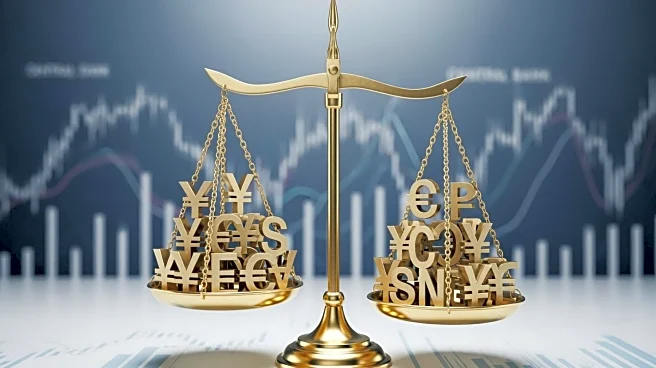What's Happening?
The U.S. dollar has snapped a six-day rally against the yen and extended a three-day falling streak versus the euro, as investors anticipate a potential U.S.-China trade deal and prepare for a week filled with central bank meetings. President Trump announced
that the U.S. and China are set to finalize a trade agreement, with a meeting between Trump and Chinese President Xi Jinping expected later this week in South Korea. The Chinese offshore yuan rose to a one-month high against the dollar, reflecting optimism in trade negotiations. Meanwhile, the Federal Reserve, European Central Bank, and Bank of Japan are all scheduled to make rate decisions this week.
Why It's Important?
The potential U.S.-China trade deal could have significant implications for global trade dynamics, impacting tariffs, supply chains, and economic growth. A successful agreement may bolster investor confidence, leading to increased demand for riskier assets and influencing currency exchange rates. The central bank meetings are crucial as they will determine monetary policy directions, affecting interest rates and financial markets worldwide. The Fed's anticipated rate cut could lower borrowing costs, stimulating economic activity, while the ECB and BoJ's decisions will influence regional economic stability.
What's Next?
Investors will closely watch the outcomes of the central bank meetings for signals on future monetary policy directions. The Fed's decision on quantitative tightening and potential rate cuts will be pivotal in shaping U.S. economic prospects. The ECB's stance on interest rates will impact the euro's strength and European economic outlook. The BoJ's meeting may provide insights into Japan's fiscal and monetary strategies, affecting the yen and regional economic conditions. The U.S.-China trade negotiations will continue to be a focal point, with potential agreements influencing global trade policies.
Beyond the Headlines
The developments highlight the interconnectedness of global economies and the impact of geopolitical events on financial markets. The trade deal negotiations underscore the importance of diplomatic relations in shaping economic policies. Central banks' decisions reflect broader economic challenges, including inflation control and growth stimulation. The currency movements indicate investor sentiment and confidence in economic stability, influencing international trade and investment strategies.
















